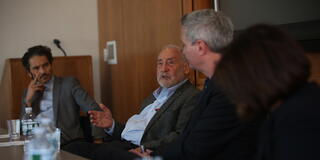Unboxing the Pandora Papers

Comprising more than 11.9 million leaked financial records, the Pandora Papers were obtained by the International Consortium of Investigative Journalists (ICIJ) earlier this year and subsequently reported on by numerous major media outlets.
As the Washington Post noted in its coverage, the Pandora Papers expose “vast reaches of the secretive offshore system used to hide billions of dollars from tax authorities, creditors, criminal investigators and—in 14 cases involving current country leaders—citizens around the world.” The trove of documents is much larger than similar recent leaks like the Panama or Paradise papers.
On October 20, a small group of SIPA students had the opportunity to hear firsthand from University Professor Joseph Stiglitz and ICIJ Director Gerard Ryle at the event “The Pandora Papers: Inequality and the Opportunity for Institutional Innovation,” which was cohosted by the MPA in Development Practice program and the Technology, Media, Advocacy and Communications specialization
MPA-DP assistant director André Corrêa d’Almeida and TMaC director Anya Schiffrin kicked off the event with remarks.
“When you have an active media, you have a stronger government response,” Schiffrin said before introducing Ryle.
Ryle described the mission of the ICIJ, a nonprofit based in Washington, D.C., that began as a network for journalists to share ideas and resources. Though the organization has a sophisticated online newsroom today, early on it was not always easy to pitch stories to potential media partners.
“When you have a scoop, you don’t want to share,” Ryle said.
Yet over time, Ryle built relationships with reporters and found that if the journalists get the scoop, then they’ll do all the pitching to their outlets. He said their first offshore tax haven story included 42 media partners and, because the datasets that ICIJ had were unique, it was easier to gain buy-in from the outlets.
“Because we publish together, it can make a huge splash around the world,” he said, citing the Czech prime minister’s recent electoral loss, the impeachment of a Chilean minister, and a renewed focus on tax laws in the United States.
Stiglitz, a Nobel Prize-winning economist, offered analysis of the document’s contents.
“The interesting aspect of [the Pandora Papers] is that a lot of people who are doing bad things don’t want them to be done in public,” he said. “The very nature of what they are doing is secret. It’s not that complicated, if you are very rich you pay tax lawyers to worry about things like that.”
“Take the case of South Dakota—it’s making money off the rest of the country,” Stiglitz said of the U.S. state that has become an onshore tax haven.
“If you ever look at [the receipt from your] bank statement, it probably came from South Dakota,” Stiglitz said. In light of laws that make it favorable for banks to locate in South Dakota as opposed to New York, he added, “the state of South Dakota is going to lobby against the kind of system that would stop that activity.”
Though the impact of the ICIJ’s work around the Pandora Papers will be felt for years to come, Ryle said that they still had to turn down more than 100 other story ideas. But they remain committed to their mission.
“We brought the [Pandora Papers] story to life by interviewing the individuals who are victims of this system,” Ryle said. “Stories are about people.”